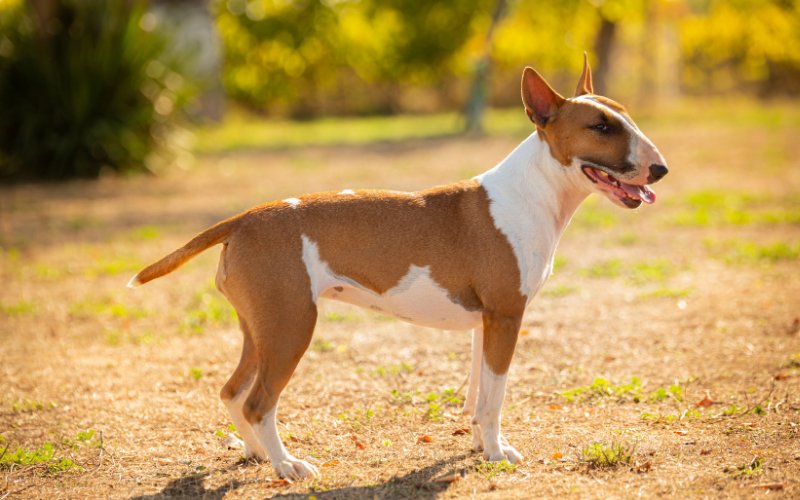
Bull Terrier Weight Management Strategies
|
Time to read 6 min
|
Time to read 6 min
©Emmanuelle Grimaud via Canva.com
Bull Terriers are known for their distinctive appearance and energetic personalities. However, like any other breed, they can be prone to weight management issues that can impact their overall well-being. Maintaining an ideal body weight is crucial for Bull Terriers as it can help prevent various health problems and extend their lifespan. In this comprehensive guide, we will explore effective strategies for managing and maintaining a healthy weight for Bull Terriers. By understanding the factors contributing to weight gain and implementing appropriate measures, you can ensure that your Bull Terrier remains fit, active, and happy.
Obesity is a common issue among dogs, with around 59% of dogs in the United States being classified as overweight or obese. Bull Terriers, with their energetic nature, are less likely to become obese if they receive regular exercise. However, it is essential to be mindful of their diet and activity levels to prevent weight gain.
Several factors can contribute to weight gain in Bull Terriers, including:
Make sure your puppy has their chewing toys unless you want your furniture or precious stuff to be destroyed by these amazing creatures!
At around 12 weeks, the deciduous teeth begin to fall out, and the permanent teeth begin to erupt. This is the perfect time for a chewing toy since your puppy will want to chew on everything in this period. This toy is also perfect for teeth cleaning in adult dogs.
Regular exercise is the cornerstone of weight management for Bull Terriers. It not only helps them burn calories but also keeps them mentally stimulated and physically fit. Here are some tips to ensure that your Bull Terrier gets enough exercise:
A well-balanced diet plays a crucial role in weight management for Bull Terriers. Here are some essential considerations when designing their diet:
Bull Terriers require a protein-rich diet to fuel their active lifestyles. However, for overweight Bull Terriers, it is important to reduce the intake of carbohydrates. While carbohydrates provide essential nutrients, they can also contribute to weight gain. Look for dog food formulas that are high in protein and low in carbohydrates. These formulas not only provide the necessary nutrients but also help your Bull Terrier burn more calories during digestion.
Feeding your Bull Terrier the right amount of food is crucial for weight management. Many dog food manufacturers provide feeding recommendations on their packaging, but it is essential to tailor these recommendations to your Bull Terrier's specific needs. Instead of feeding one large meal, divide their daily intake into two or three smaller meals. This helps prevent overeating and keeps their metabolism active throughout the day.
While treats can be a great way to reward your Bull Terrier, it is important to choose healthy alternatives, especially if they are overweight. Instead of high-fat treats like biscuits and cheese, opt for fresh chopped vegetables like carrots, apple slices, or green beans. These low-calorie options provide nutritional benefits without adding excessive calories to their diet.
To ensure portion control and accurate feeding, it is important to measure your Bull Terrier's meals. Use a slow-feeding food bowl with a built-in scale to serve the appropriate amount of food recommended by your veterinarian. This helps prevent overfeeding and ensures that your Bull Terrier is receiving the right balance of nutrients.
While treats are commonly used as rewards, there are many non-food alternatives that can be just as rewarding for your Bull Terrier. Belly rubs, head massages, and verbal praise are excellent ways to show your appreciation. Additionally, engaging in playtime with their favorite toys can be a fun and rewarding experience for your Bull Terrier.
Did you know that Bull Terriers can have difficulty swimming because of their muscular constitution?
The Double Support Life Jacket is the perfect solution because its highly buoyant design keeps your Bull Terrier afloat effortlessly, reducing muscle strain and ensuring they can swim with ease. Say goodbye to the frustration of watching your pup struggle in the water.
If you are struggling with managing your Bull Terrier's weight or have concerns about their health, it is important to consult with a veterinarian. A veterinarian can provide tailored advice and guidance based on your Bull Terrier's specific needs and health conditions. They may recommend specific diets, exercise routines, or additional interventions to help your Bull Terrier achieve and maintain a healthy weight.
Obesity in Bull Terriers can lead to various health problems and reduce their overall quality of life. Some of the health risks associated with obesity include:
Once your Bull Terrier has achieved their weight loss goals, it is important to maintain their healthy weight. Regular monitoring and appropriate adjustments to their diet and exercise routine are necessary. Here are some tips for maintaining weight loss in Bull Terriers:
Ensure your Bull Terrier receives optimal nutrition with our Slow Feeder Bowl With Built-in Scale. Experience precise portion control, hassle-free maintenance, and accurate feeding for a balanced diet.
Simplify mealtime and prioritize your Bull Terrier's well-being with this innovative solution. The non-slip feature prevents spills, ensuring a hassle-free dining experience for your beloved pet.
Exploring weight management strategies for Bull Terriers is essential for promoting their overall health and well-being. Regular exercise, a balanced diet, portion control, and appropriate rewards are key elements in managing their weight effectively. By understanding the risks associated with obesity and implementing preventative measures, you can ensure that your Bull Terrier enjoys a long, healthy, and active life. Remember, each Bull Terrier is unique, so personalized advice from a veterinarian is always recommended to ensure their specific needs are met. Prioritize your Bull Terrier's weight management, and they will thank you with years of joy and companionship.
Disclaimer: This article is for informational purposes only. Always consult with a veterinarian or animal healthcare professional for personalized advice and guidance regarding your Bull Terrier's weight management strategies.